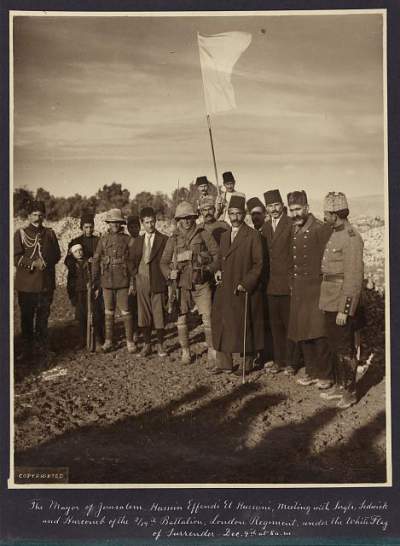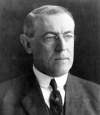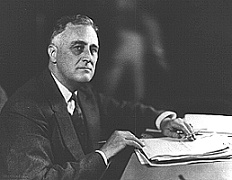
December 9
1854 Crimean War: The poem "The Charge of the Light Brigade" by Alfred, Lord Tennyson, is published in England. (AP)
The following extract has long reflected the lot of the rank and file:
'Forward, the Light Brigade!' 1868 Birth: Fritz Haber:
He was born in Breslau, Germany and from 1886 until 1891 he studied at the University of Heidelberg under Robert Bunsen, at the University of Berlin in the group of A. W. Hoffmann, and at the Technical College of Charlottenburg (today the Technical University of Berlin) under Carl Liebermann. Before starting his own academic career he worked at his father's chemical business and in the Institute of Technology at Zuerich with Georg Lunge. During his time in Karlsruhe from 1894 until 1911 he and Carl Bosch developed the catalytic formation of ammonia from hydrogen and nitrogen. This was important, especially during World War I, since ammonia is used in industrial processes such as explosives production.
He was also active in the research of combustion reactions, the separation of gold from sea water, adsorption effects, and electrochemistry. A large part of his work from 1911 to 1933 was done at the Institute for Physical and Electrochemistry at Berlin-Dahlem. It should also be mentioned that he was also active in the first gas attacks in World War I. In the 1920s he developed the gas Zyklon B, which he intended to be applied as an insecticide, but was instead later used in the concentration camps. In 1918 he received the Nobel Prize for the fixation of nitrogen from the air, the Haber process. Being Jewish, he was forced to emigrate by the Nazis in 1934. He died in Basel after a grave illness.
1908 Social Conditions: A child labor bill passes in the German Reichstag, forbidding work for children under the age of 13.
1917 World War I: Various: Jerusalem surrenders to British troops:
On the morning of this day in 1917, after Turkish troops move out of the region after only a single day s fighting, officials of the Holy City of Jerusalem offer the keys to the city to encroaching British troops. [Note: According to legend, the Arab mayor and the chief of police of Jerusalem originally tried to surrender the city to the first British soldiers (sergeants) they encountered outside the city. Their response was "We don't want no keys to no 'oly city. We want heggs for our hofficers." —Ed.]
The British, led by General Edmund Allenby, who had arrived from the Western Front the previous June to take over the command in Egypt, entered the Holy City two days later under strict instructions from London on how not to appear disrespectful to the city, its people, or its traditions. Allenby entered Jerusalem on foot—in deliberate contrast to Kaiser Wilhelm s more flamboyant entrance on horseback in 1898—and no Allied flags were flown over the city, while Muslim troops from India were dispatched to guard the religious landmark the Dome of the Rock.
In a proclamation declaring martial law that was read aloud to the city s people in English, French, Arabic, Hebrew, Russian and Greek, Allenby assured them that the occupying power would not inflict further harm on Jerusalem, its inhabitants, or its holy places. "Since your city is regarded with affection by the adherents of three of the great religions of mankind and its soil has been consecrated by the prayers and pilgrimages of multitudes of devout people, I make it known to you that every sacred building, monument, holy spot, shrine, traditional site, endowment, pious bequest, or customary place of prayerwill be maintained and protected according to the existing customs and beliefs of those to whose faith they are sacred."
Church bells in Rome and London rang to celebrate the peaceful British arrival in Jerusalem. Allenby s success, after so much discouragement on the Western Front, elated and inspired Allied supporters everywhere. (History.com)
Brest-Litovsk: Peace talks begin between Germany and Russia at Brest-Litovsk in Belorussia.
Finland:
1918 Armistice: Allied troops cross the Rhine into Germany, taking bridgeheads as agreed upon in the armistice. The British at Cologne, the Americans at Koblenz, and the French at Mainz.
1920 Nobel Peace Prize: Awarded to President Woodrow Wilson.
1922 Poland: Gabriel Narutowicz (1865-1922) elected as the first president:
After Poland regained independence in 1918, he became involved in politics and served as minister of public works 1920-1921 and as minister of foreign affairs in 1922.
On December 9, 1922 the National Assembly elected him the first president of Poland and he was sworn in on December 14. As a socialist, he was heavily criticized by the National Democracy party and fatally shot on December 16, 1922 by that party's fanatical supporter, Eligiusz Niewiadomski, at a Warsaw art gallery after only two days in office. The president was buried in the Warsaw Cathedral
1931 World War II: China: The Japanese army attacks the Chinese province of Jehol.
1933 Spain: Hundreds of Spaniards are killed and wounded when the Monarchist government crushes an anarchist uprising.
1936 Various:
Lebensraum: From a speech by Hjalmar Schachtt at Frankfurt: Germany has too little living space for her population. She has made every effort, and certainly greater efforts than any other nation, to extract from her own existing small space whatever is necessary for the securing of her livelihood. However, in spite of all these efforts, the space does not suffice.
Switzerland: Trial of David Frankfurter (1909 - 1982), best known for assassinating Swiss Nazi leader Wilhelm Gustloff in 1936, begins:
After completing his basic education he began a study of medicine, for which he traveled to Vienna, Leipzig and Frankfurt. The rise of Nazi power in Germany compelled him to relocate to Switzerland to continue his studies, and he settled in Bern in 1934.
Having become convinced of the danger posed by the Nazis, Frankfurter kept an eye on Gustloff, head of the Foreign Section of the Nazi party in Switzerland, (NSDAP) who ordered the Protocols of the Elders of Zion to be published in Switzerland. This culminated in the assassination which occurred in Davos on February 4, 1936. Frankfurter found Gustloff's address in a simple phonebook and on that day went to the Gustloff's home; Gustloff's wife, Hedwig Gustloff, received him and showed him into the study, asking him to wait since her husband was on the telephone but would be with him presently. When Gustloff, who was in the adjoining room, entered his office where Frankfurter was sitting opposite a picture of Hitler, Frankfurter shot him five times in the head, neck and chest; he left the premises (according to Heinz Schoen, while hearing Hedwig Gustloff's cries), went into the next house and asked to use the telephone. He rang the police and confessed to the murder. Immediately he went to the police station and coldly told the police what had happened. Frankfurter was put on trial for the assassination in Chur on December 9 of that year.
Although the assassination was not unfavorably received by the largely anti-Nazi population of the country, the Swiss government prosecuted the case strictly, owing to concerns about its status of neutrality. Frankfurter was convicted of the killing and sentenced to an eighteen-year prison term.
1939 World War II: Finland: USSR makes an air raid on Helsinki.
1940 World War II: British launch offensive against Italians in North Africa:
On this day, two British divisions, half of them composed of Indian troops, attack seven Italian divisions in Egypt. Overwhelmed, the Italian position in Egypt collapsed.
Italy had declared war on Great Britain in June. At that time, Italian General Rodolfo Graziani had almost 10 times the number of men in Libya than the British forces in Egypt under General Archibald Wavell, which were commissioned to protect the North African approaches to the Suez Canal. A vast western desert stretched between the antagonists, who sat for months without confrontation. In the meantime, Italian forces had passed into Egypt—but Britain had also reinforced its own numbers. British cryptographers were also able to break the Italian military code, enabling British commanders to anticipate Italian troop movements, size, and points of vulnerability.
British command decided to make a first strike. On December 7, armored car patrols surreptitiously set out to determine gaps in the minefield the Italians had laid. On December 9, Major General Richard Nugent O'Connor from Mersa Matruh in Egypt launched a westward offensive. Thirty thousand Brits warred against 80,000 Italians—but the British brought with them 275 tanks against the Italians' 120. As O'Connor cut through a gap in the chain of forts the Italians had established, the British 7th Armored Division swept along the western coast to cut off any hope of an Italian retreat. Within three days, 40,000 Italian prisoners were taken. The end of the Italian occupation of North Africa had begun. (History.com)
1941 World War II: Various:
War in the Pacific: From a Radio Address Delivered by President Roosevelt From Washington: So far, the news has all been bad. We have suffered a serious setback in Hawaii. Our forces in the Philippines, which include the brave people of that Commonwealth, are taking punishment, but are defending themselves vigorously. The reports from Guam and Wake and Midway Islands are still confused, but we must be prepared for the announcement that all these three outposts have been seized. The casualty lists of these first few days will undoubtedly be large. I deeply feel the anxiety of all families of the men in our armed forces and the relatives of people in cities which have been bombed. I can only give them my solemn promise that they will get news just as quickly as possible. This Government will put its trust in the stamina of the American people.
War in the Pacific: The first US bombing mission in the Far East takes place over Luzon, Philippines.
China formally issues a declaration of war against the Axis Powers: Japan, Germany and Italy.
Japanese Foreign Minister Circular:
The Imperial Japanese forces, however, right at the outset and in one heavy attack, have achieved the following: two battleships sunk, four severely damaged, four heavy cruisers severely damaged (three are confirmed), one aircraft carrier sunk and over one hundred aircraft destroyed. It may be said that the main strength of the American Pacific Fleet has been practically annihilated. From now on the Imperial Navy will be able to extend the scope of its activities little by little to the South Atlantic and South Pacific and it is clear at least that we shall obtain command of the seas in the South Pacific before long. Even, therefore, if economic intercourse between JAPAN and the South American States bordering the Pacific be cut off for the time being, it will not be long before communication is restored. Not only so, but intercourse with ARGENTINA and BRAZIL by merchant ships in convoy will be urged upon these two countries, while sea communications with BRITAIN, AMERICA, and Latin AMERICA will, on the other hand, be severed by the Imperial Navy.
War at Sea: Even though war has not been declared between the US and Germany, Adolf Hitler declares open season on US ships.
1943 Poland: The Polish underground executes two Poles for betraying Jews to the Gestapo, and for denouncing Poles who sheltered Jews.
1944 World War II: Various:
Churchill to General Wilson (Italy): You should send further reinforcement to Athens without the slightest delay. The prolongation of the fight has many dangers. I warned you of the paramount importance of this conflict. At least two more brigades should hurry to the scene. 2. In addition to the above, why does not the Navy help all the time instead of only landing a small number in a crisis? You guaranteed most strongly that you had already sent enough soldiers.
Churchill to Hopkins:
I was very much upset by the last sentence of the Stettinius Press release (December 5), which seemed to reflect on the whole of our foreign policy in Belgium, where we acted under your orders, and in Greece, where our action was fully approved at Quebec. Naturally, the prolongation and severity of the fighting in Athens with E.L.A.S. causes me anxiety . . . . I hope you will tell our great friend that the establishment of law and order in and around Athens is essential to all future measures of magnanimity and consolation towards Greece. After this is established will be the time for talking. My guiding principle is "No peace without victory." It is a great disappointment to me to have been set upon in this way by E.L.A.S. when we came loaded with good gifts and anxious only to form a united Greece which could establish its own destiny. But we have been set upon, and we intend to defend ourselves. I consider we have a right to the President's support for the policy we are following. If it can be said in the streets of Athens that the United States are against us, then more British blood will be shed and much more Greek. It grieves me very much to see signs of our drifting apart at a time when unity becomes ever more important, as danger recedes and faction arises.
1945 World War II: General George S. Patton is injured in a car-truck collision near Mannheim, Germany.
1946 Doctors' Trial: An American military tribunal in Nuremberg opens criminal proceedings against 23 leading German physicians and administrators for participation in war crimes and crimes against humanity. The defendants are accused of planning and enacting the 'Euthanasia' Program, the systematic killing of those they deemed 'unworthy of life.' The victims included the mentally retarded, the institutionalized mentally ill, and the physically impaired. (See Aug 20)
1948 Genocide: The UN General Assembly approves the Convention on Prevention and Punishment of the Crime of Genocide.
1950 Harry Gold sent to prison for his role in atomic espionage:
Harry Gold--who had confessed to serving as a courier between Klaus Fuchs, a British scientist who stole top-secret information on the atomic bomb, and Soviet agents--is sentenced to 30 years in jail for his crime. Gold's arrest and confession led to the arrest of David Greenglass, who then implicated his brother-in-law and sister, Julius and Ethel Rosenberg. [For further information, click here]
1951 Various: West Germany: 1958 USA: John Birch Society founded:
In Indianapolis, retired Boston candy manufacturer Robert H.W. Welch, Jr., establishes the John Birch Society, a right-wing organization dedicated to fighting what it perceives to be the extensive infiltration of communism into American society. Welch named the society in honor of John Birch, considered by many to be the first American casualty in the struggle against communism. In 1945, Birch, a Baptist missionary and U.S. Army intelligence specialist, was killed by Chinese communists in the northern province of Anhwei.
The John Birch Society, initially founded with only 11 members, had by the early 1960s grown to a membership of nearly 100,000 Americans and received annual private contributions of several million dollars. The society revived the spirit of McCarthyism, claiming in unsubstantiated accusations that a vast communist conspiracy existed within the U.S. government. Among others, the organization implicated President Dwight D. Eisenhower and Supreme Court Chief Justice Earl Warren. However, after the debacle of Senator Joseph McCarthy's public hearings in the early 1950s, America became more wary of radical anti-communism, and few of the society's sensational charges were taken seriously by mainstream American society. The John Birch Society remains active today, and its members seek "to expose a semi-secret international cabal whose members sit in the highest places of influence and power worldwide." (History.com)
1961 Holocaust: SS Colonel Adolf Eichmann is found guilty at Jerusalem of crimes against humanity, including Jews, Poles, and Slovenes. Full text of verdict.
1990 Poland: Walesa elected president: "In Poland, Lech Walesa, founder of the Solidarity trade union, wins a landslide election victory, becoming the first directly elected Polish leader." [For further information, click here]
Edited by Levi Bookin (Copy editor) Click to join 3rdReichStudies
FAIR USE NOTICE: This site may contain copyrighted material the use of which has not always been specifically authorized by the copyright owner. We are making such material available in our efforts to advance understanding of historical, political, human rights, economic, democracy, scientific, environmental, and social justice issues, etc. We believe this constitutes a 'fair use' of any such copyrighted material as provided for in section 107 of the US Copyright Law. In accordance with Title 17 U.S.C. Section 107, the material on this site is distributed without profit to those who have expressed a prior interest in receiving the included information for research and educational purposes. If you wish to use copyrighted material from this site for purposes of your own that go beyond 'fair use', you must obtain permission from the copyright owner.
Please note that the list-owner and the moderator are not responsible for, and do not necessarily approve of, the random ads placed on our pages by our web server. They are, unfortunately, the price one pays for a 'free' website.
Was there a man dismay'd?
Not tho' the soldiers knew
Some one had blunder'd:
Theirs not to make reply,
Theirs not to reason why,
Theirs but to do and die:
Into the valley of Death
Rode the six hundred.








levi.bookin@gmail.com






